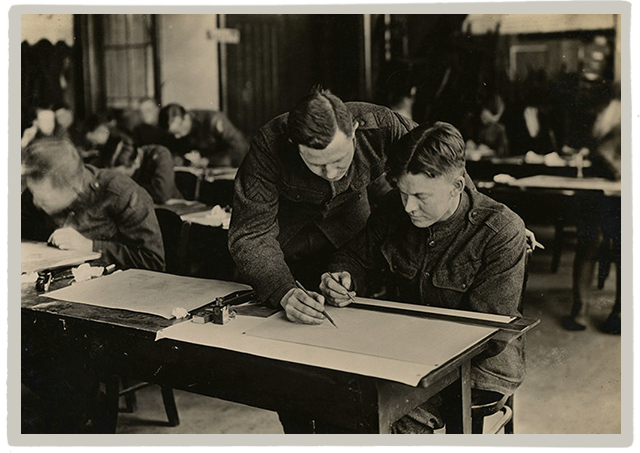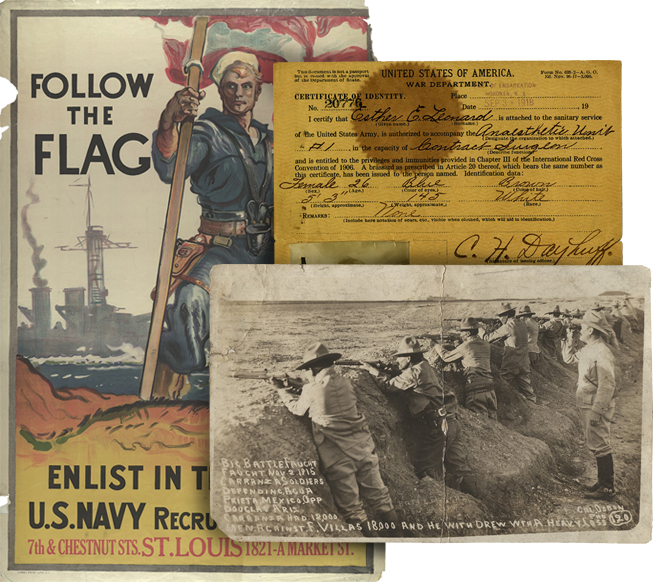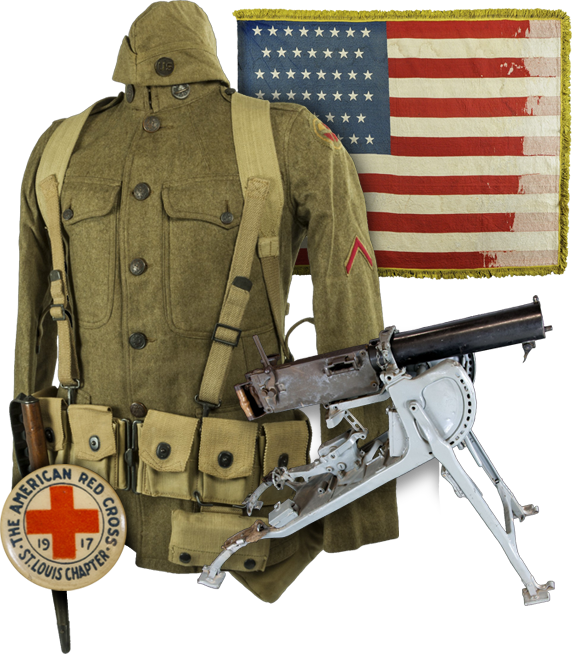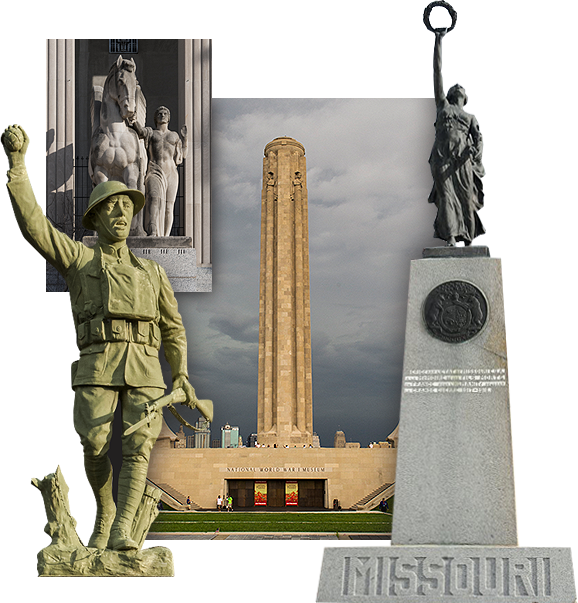August Stockebrand letter to Bernard Rustemeyer - April 1920

Transcript
Korbecke, Easter 1920 Mr. Bernard Rustemeier Vosholl, Osage County [Missouri] North America My dear Cousin Bernard, In this Easter season I took your welcome letter of December 15, 1915 in hand, and will try to give you an answer, dear cousin. I have already written twice, but I take it that no letter has been sent to you about this in the aftermath of the dreadful war, and so once again, this letter. Dear Bernard, I want first to tell you about this dreadful war. It is terrible to think of. I had to send two beautiful strong sons, aged 25 and 27, into this terrible war. August, the older son, was wounded for the first time in France in September, 1914. That went well; he became healthy again and on January 15 had to go to Russia where he was wounded a second time during the terrible fighting at Grassna. Fortunately both were leg wounds, the last one rather severe, but after about 5 months he had to go to Russia again. There he engaged as a leader in the heavy fighting in the near east. Then, from 1917 on, he was an administrative official in Lettauen (Russia) and returned home on January 19. Before the war the only objective for this oldest son was the business, and now what? The business has lain idle since January 15 because no rye nor barley were available for brewing. We had a steam distillery since 1897 and business was bustling, but lay idle in the war which followed, with no prospect, for now, of getting back into business again. We earned a lot of money before the war, and we still have the 75 Morgen farm off of which we live. But more about that later. My second son, Ferdinand, 25 years old, was a handsome son -- big, strong, at least half a head taller than I when you left here. He was an industrious farmer and employed in a nearby business. I could rely on him completely as with a [MS illegible] I could relax. Dear Bernard, I never saw this big man again. He was first wounded in the Congo, of which you have certainly heard, and after 14 days he died in Nigeria on February 24, 1915. Oh, God! How this good fellow probably suffered, dying without help and far from his homeland! I could not believe it at first, and it is indeed terrible. You can't imagine what the summer is like. From year to year it gets longer. But our dear Lord God will have loved him, for there is no longer any pleasure living in Germany. What anguish! We in Germany are poorer than poor. We have paper money in abundance, but it is, in a word, worthless. Now we also have Bolsheviks in the country and mainly will be from now on. Last week there were heavy battles at Hamm, in the village of Pelkun, where three hundred of the Red army fell dead in two hours last Sunday. And as if the dreadful war weren't enough, there has been a dreadful civil war or famine. The big city in the Jewish district has almost nothing more to live on, so that every day we are afraid that we'll be robbed. Dear Bernard, you cannot imagine how it is here in Germany as a result of the war, to go from having everything cheaply to having nothing for any amount of money, not even the needed clothing. For our sustenance we do have everything that the farm affords, but when it comes to clothing and linen there is a shortage, and very severe one at that. Shoes, too, are enormously expensive and of poor quality. Now I come to my youngest son. At the beginning of the war he was still a freshman in high school in Brilon. He wanted to get into the war. Because he was not yet 17 he needed my approval, which I did not give. At Eastertime in 1915 he took his final exam and became a doctor. In the Fall of 1916 he was drafted for medical service but after a year and a half he is free of the military. Now in the course of this year he will be a medical doctor. He is a magnificent man, now 23 years old. Had it not been for the war he would have gotten to this point a year ago. But that is not bad. He is still at it early enough, if only the circumstances here would become bearable again. I also have two daughters, of whom the older is married, in Menden, and the younger is still at home. I and my wife are still quite active even though we're nearly 63 years old. To be sure I can do practically nothing because my eyesight is very poor. Please forgive my bad handwriting. I can write all right in daylight, but that is gone now and so I will continue tomorrow...Dear cousin Bernard, for the second time I take pen in hand in order to share some more with you. I have described my family conditions. I will briefly describe my financial conditions. We have sufficient means but awat developments following the war. Nothing is worth much anymore. I have 75 Morgen of farmland, 2 horses and still have five cows. Before the war I had five times as many cows and 3 or 4 horses.This remains questionable until the dreadful famine and the civil war, which is imminent, becomes a thing of the past. God will help us, or else Germany will be lost forever. Now you want badly to hear about the other relatives. Uncle Giese (Banten) died long ago. Cousin Josef is at home but has no children. Uncle Schulte (Gurres) also died long ago. Cousin Albert fares reasonably well. He has many children is alive. In Soest Uncle Josef died long ago and the cousins are two teachers. Bernard is a court officer. August is with the postal service. Now about Altekoesters (Schleps). There things are going well also. Anton has a bakery and farm, Franz is a carpenter, Heinrich is a bailiff in Ruhrort. He is doing well, but just as for us, nothing can be had for money. Here in Koerbecke there was progress before the war, but now it is all gone. You wrote about the prices of food there. I will write to you about our prices in general. One pays 150 Mark or more for 100# of wheat or Rye, 250-290 Mark for 100# of oats, up to 30 Mark per pound for ham and bacon; 10-12 Mark or more for a pound of beef; 30 Mark or more for butter - and so everything else. A liter of brandy is 40-50 Mark; a man's suit is 1500-2500 Mark; a pair of shoes, 300-1000 Mark. You see paper money in abundance but not a piece of gold or silver is left, only our paper money, which is worthless to you. I laid aside some [manuscript incomplete]
Description
In this Easter 1920 letter to his cousin Bernard Rustemeyer of Osage County, Missouri, August Stockebrand of Korbecke, Germany discussed how the war affected his family. Translation provided by Raymond Backes.




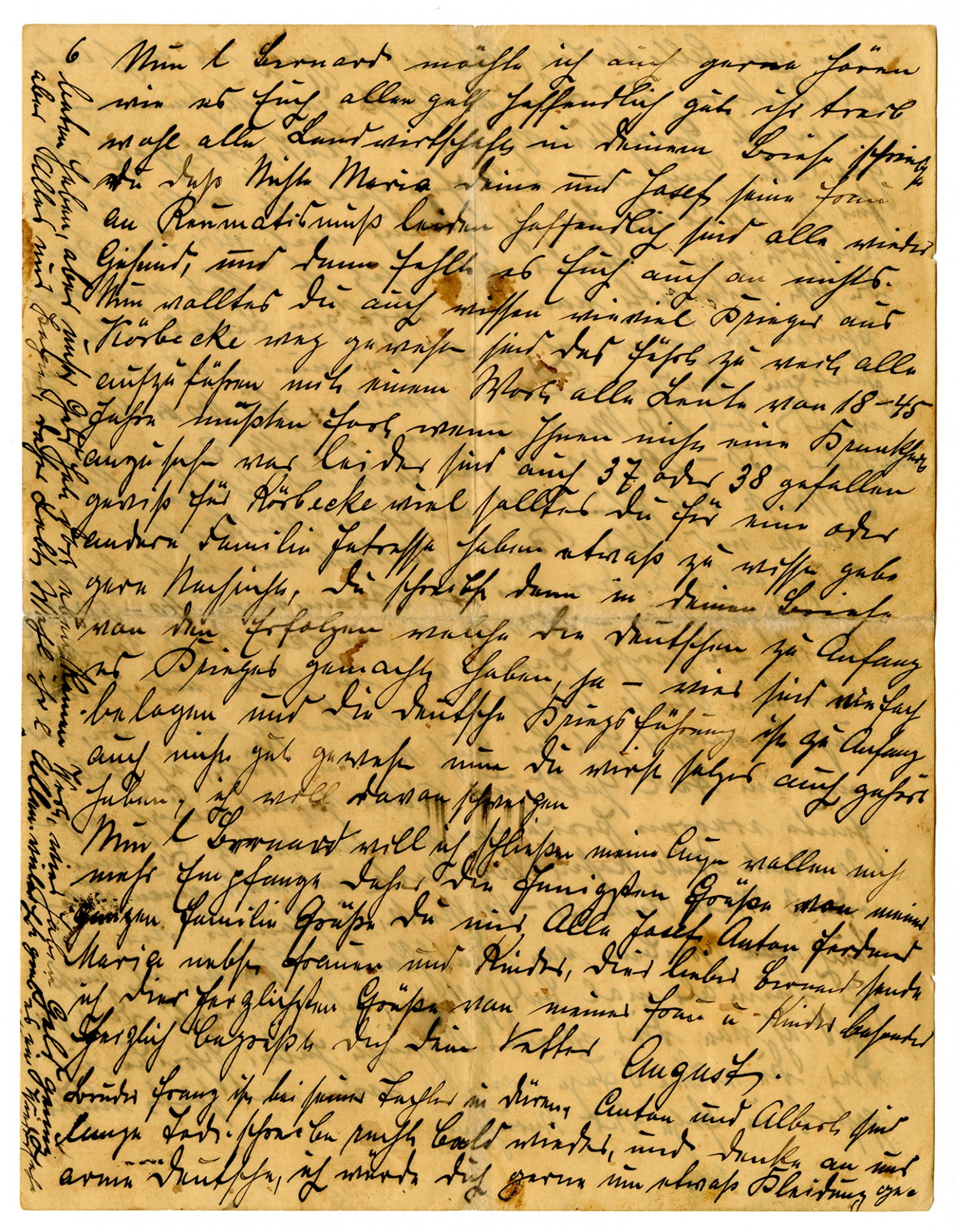
Details
| Title | August Stockebrand letter to Bernard Rustemeyer - April 1920 |
| Creator | Stockebrand, August |
| Source | Stockebrand, August. Letter to Bernard Rustemeyer. April 1920. Rustemeyer Family, Papers, 1884-1953. C4017. The State Historical Society of Missouri, Columbia, Missouri. |
| Description | In this Easter 1920 letter to his cousin Bernard Rustemeyer of Osage County, Missouri, August Stockebrand of Korbecke, Germany discussed how the war affected his family. Translation provided by Raymond Backes. |
| Site Accession Number | C4017 |
| Contributing Institution | The State Historical Society of Missouri |
| Copy Request | Transmission or reproduction of items on these pages beyond that allowed by fair use requires the written permission of the State Historical Society of Missouri: 1020 Lowry Street, Columbia, Missouri, 65201-7298. (573) 882-7083. |
| Rights | The text and images contained in this collection are intended for research and educational use only. Duplication of any of these images for commercial use without express written consent is expressly prohibited. |
| Language | German |
